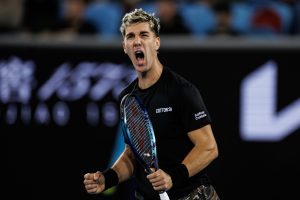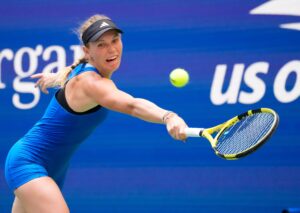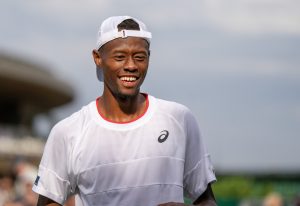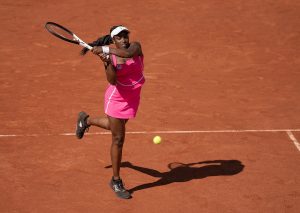Ahead of the Olympic Tennis Finals this weekend, Martin Keady, our resident tennis historian, takes a look back at the history of the Men’s Singles in modern Olympic Tennis.
Just as modern tennis is often considered to have begun in 1968, with the start of the Open (or fully professional) era, so modern Olympic tennis is often thought to have started in 1988, with the reintroduction of tennis to the Summer Olympics. Remarkably, before then tennis had been absent from the Olympics for 64 years, from the 1924 Games onwards, as a result of a clash between the International Tennis Federation and the International Olympic Committee over the precise definition of “amateurism”.
The Olympic Men’s Singles tournament is not quite a Fifth Major: how could it be, when it is played out over a week, with just three-set matches? However, it can be thought of as the Ultimate Masters tournament – a seven-day succession of three-set shootouts, as a result of which almost anyone can win. And that has been proven, with Novak Djokovic failing at the semi-final stage in a remarkable capitulation to Alexander Zverev.
Here, then, is a Brief History of Modern Olympic Men’s Tennis.
Seoul 1988: Miloslav Mečíř beat (Cze) beat Tim Mayotte (USA) 3-6, 6-2, 6-4, 6-2
Miloslav Mečíř is one of the most gifted tennis players never to win a Major, arguably heading a list, which also includes Tim Henman and Kei Nishikori, that nobody wants to be on. He reached two Major Finals (at the 1986 US Open and the 1989 Australian Open), losing both to Ivan Lendl, the dominant male player in the second half of the 1980s. Consequently, his Olympic Singles victory in 1988 was probably the highlight of his career. He defeated Tim Mayotte, just one of many fine American players in the 1980s who would probably be the American No.1 today, in the Final. However, Mečíř’s semi-final victory was perhaps even more impressive, as he defeated Stefan Edberg, who had only just won his first Wimbledon title earlier that summer, in five sets, 3-6, 6-0, 1-6, 6-4, 6-2.
Barcelona 1992: Marc Rosset (Switzerland) d. Jordi Arrese (Spain) 7-6, 6-4, 3-6, 4-6, 8-6
Barcelona is the only modern Olympic Games where the tennis event has been played on clay, which naturally benefited Spain’s numerous clay-court specialists. One of them, Jordi Arrese, made it all the way to the Final, but he lost a genuine epic – arguably the finest Modern Olympic Men’s Singles Final so far – to Marc Rosset of Switzerland. Rosset won the first two sets and seemed set for a straight-sets triumph, until Arrese, cheered on by a fanatical home crowd revelling in Spain’s impressive overall performance at the Games, won the next two sets. The fifth set was a tense affair, with Rosset somehow finding the will to win the match right at the death, 8-6, to secure by far the biggest win of his career. In the process, he inspired a watching Roger Federer, then only 10, to dream of winning an Olympic Singles title himself, a dream that finally ended this summer when he had to withdraw from Tokyo after his injury woes over the last year.
Atlanta 1996: Andre Agassi (USA) beat Sergi Bruguera (Spain) 6-2, 6-3, 6-1
Winning Olympic Gold on home hardcourt was one of the highlights of Andre Agassi’s remarkable, roller-coaster 1990s, when he oscillated between winning Majors (eventually completing the Career Slam at the French Open in 1999) and plunging down the world rankings. Indeed, the triumph in Atlanta was by far the best achievement of 1996 for Agassi, as he comfortably won the final in straight sets against Sergi Bruguera, who was a double French Open Champion after winning at Roland Garros in 1993 and 1994.
Worse was to come for Agassi the following year, when injuries contributed to a nearly vertical plunge down the world rankings and a failed drugs test for smoking crystal meth, which he escaped at the time by claiming a drink had been spiked but later confessed had been entirely deliberate. If that failed drugs test had come in Atlanta a year earlier, it would have been an Olympic drug bust to eclipse even that of Ben Johnson in Seoul in 1988.
Sydney 2000: Yefgeny Kafelnikov (Russia) beat Tommy Haas (Germany) 7–6 (7–4), 3–6, 6–2, 4–6, 6–3
Sydney 2000 was one of the three five-set Men’s Singles finals in modern Olympic tennis, with Russia’s Yefgeny Kafelnikov swapping sets with Germany’s Tommy Haas until he finally triumphed 6-3 in the fifth set. Kafelnikov had already won two Majors (the 1996 French Open and the 1999 Australian Open) and the Olympic Gold capped a tremendous hat-trick of titles in the second half of the 1990s. For Tommy Haas, who reached four Major semi-finals (three in Australia and one at Wimbledon) but never won any of them, the Olympic Final was probably the biggest match of his career. Consequently, he fought to the end of it, before finally capitulating to Kafelnikov.
Athens 2004: Nicolás Massú (Chile) beat Mardy Fish (USA) 6–3, 3–6, 2–6, 6–3, 6–4
Roger Federer’s best chance of winning Olympic Singles Gold probably came in Athens in 2004. He entered the tournament as a three-time Major winner, having already won two Wimbledon titles and an Australian Open over the previous year, and before the emergence of Rafael Nadal and Novak Djokovic he was the undoubted favourite to win the Olympics in Greece, the birthplace of the Games. However, he suffered a shock second-round loss to Tomas Berdych, several years before Berdych’s own emergence as a fully-fledged top 10 player and Major Finalist. So, instead of Federer winning the one “Major” title that has always eluded him, it was Chile’s Nicolás Massú who won another five-set Final against a man who may have the most unforgettable name in tennis history – America’s Mardy Fish.
Beijing 2008: Rafael Nadal (Spain) beat Fernando González (Chile) 6–3, 7–6 (7–2), 6–3
Four years after Athens, Rafael Nadal had emerged not just as a challenger to Roger Federer but as his conqueror, not only defeating him in a third French Open Final in succession but ending his five-year reign at Wimbledon. Nadal maintained that astonishing momentum at the Olympics, beating Novak Djokovic in the semi-final before defeating Fernando González in straight sets in the Final. González could not match his compatriot Massú’s feat of winning Olympic Gold four years earlier. However, in becoming the second Chilean man in succession to reach the Olympic Singles Final, he confirmed that Chile was fast emerging as the biggest challenger to Argentina as the greatest tennis nation in South America.
London 2012: Andy Murray (GB) beat Roger Federer (Switzerland) 6–2, 6–1, 6–4
There is one man for whom Olympic tennis is undoubtedly a big deal – Britain’s Andy Murray, whose Olympic Singles triumph in 2012 provided the platform for a remarkable four-year run that included three Majors (two Wimbledons and a US Open), a Davis Cup triumph and a second Olympic Singles Gold (more on that below), culminating in his brief but none the less historic rise to World No.1 at the end of 2016. All of those incredible achievements began at Wimbledon in the summer of 2012, where just over a month earlier he had lost his first Wimbledon Final to Roger Federer in four sets.
The two men met again in undoubtedly the finest setting for an Olympic tennis final ever and this time Murray shocked the world, and the great Swiss, by beating him in straight sets. It was perhaps the one time that Federer has not enjoyed “home support” anywhere in the world, as the partisan British fans for once forget their adoration of Federer and cheered Murray to a stunning and ultimately comfortable victory.
Rio 2016: Andy Murray (GB) beat Juan Martín del Potro (Argentina) 7–5, 4–6, 6–2, 7–5
The setting for Andy Murray’s second successive Olympic Men’s Singles victory was not nearly as impressive as the first. Obviously, the Barra Olympic Park in Rio could not compare to the lush lawns and history of Wimbledon. In addition, however, the tennis, like so many Olympic sports in Rio, barely attracted a crowd. There may be no fans at Tokyo in 2020 because of Covid, but there were virtually none at Rio in 2016 because the poor (and even lower-earning people) of Rio largely boycotted the Games, in protest at what they regarded as its disproportionate expenditure on sporting infrastructure rather than on actual infrastructure. Nevertheless, Murray ignored the many empty seats to beat Juan Martín del Potro in four sets in the Final and became the first man or woman since 1988 to retain their Olympic Singles title.
Next time: a brief history of Modern Olympic Women’s Tennis.
Main Photo:
Embed from Getty Images






